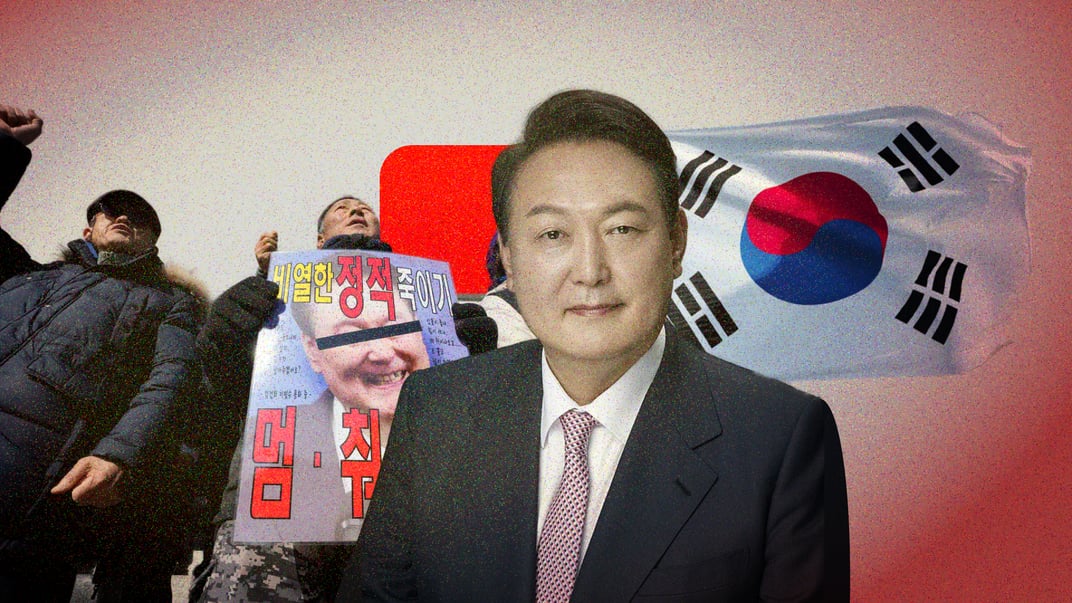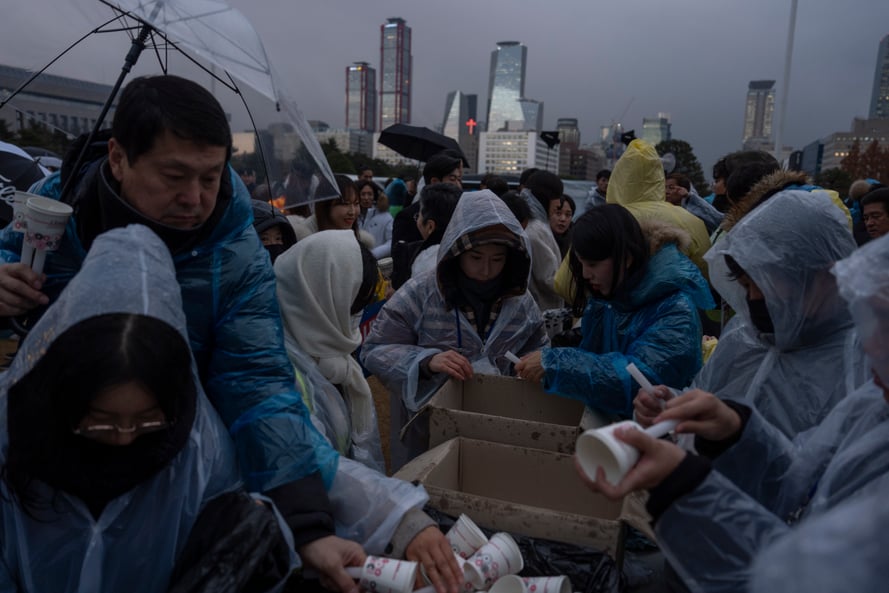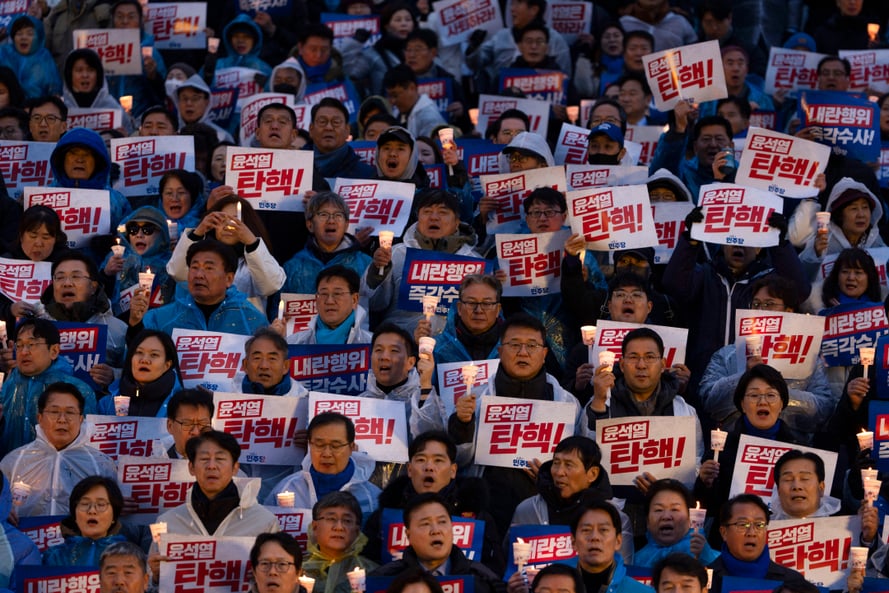**Shocking Turn of Events: Military Rule Declared in South Korea!** In a stunning move, a leader has declared martial law, citing threats to democracy. As protests erupt and political te...

Tragicomedy That Almost Became a Tragedy
The President of South Korea, Yoon Suk-yeol, declared a state of martial law overnight, justifying his decision as a means of "protecting the constitutional order and combating anti-state forces that sympathize with North Korea."
Since the end of the Korean War in 1953, martial law has been declared in South Korea 16 times until democracy was firmly established in the country. The last instance was following the assassination of President Park Chung-hee in 1979. Thus, President Yoon Suk-yeol's actions came as a significant shock to Korean society.
Yoon Suk-yeol's decision to impose martial law was criticized even by the head of his own ruling party, the People Power Party, Han Dong-hoon. Ironically, North Korean authoritarian leader Kim Jong-un also made an official statement condemning the South Korean president's actions, labeling the martial law as an assault on the rights of citizens of the neighboring state.
The introduction of the new martial law followed months of confrontation between the president and his own parliament, where the ruling People Power Party lost its majority after the spring 2024 elections. In April, the opposition party Toburo won the parliamentary elections, insisting on impeaching the sitting president.
The standoff between the president and the opposition, which holds the majority in parliament, escalated into a severe political crisis. President Yoon Suk-yeol repeatedly exercised his veto power and blocked legislation from opposition parties, which in turn refused to vote on the national budget for 2025.
After this, the president accused the parliament of "sympathizing with North Korea and engaging in anti-state activities that paralyzed the country." Meanwhile, the opposition accused Yoon of refusing to investigate several corruption scandals involving his wife and high-ranking officials. The opposition demanded the resignation of three prosecutors for their failure to investigate corruption allegations against the First Lady.
In January 2024, a scandal erupted in South Korea over a video published by all major news outlets in the country. In it, the president's wife, Kim Keon-hee, receives a gift bag from the brand Dior worth over $2,000. This act violated laws regarding illegal gifts, as she is not permitted to accept expensive gifts while her husband is president. In response to the criticism raised in the media, Yoon Suk-yeol issued a presidential decree prohibiting investigations into corruption matters against himself and his family.
Overall, it is difficult to describe Yoon as a president who enjoyed significant popularity in the country. In 2022, he won the presidential election with a slim margin of 0.73% over the leader of the Toburo party, Lee Jae-myung. Upon taking office, Yoon quickly found himself embroiled in a series of scandals, adversely affecting his approval ratings. In addition to corruption allegations, Yoon Suk-yeol's term has been marked by a severe crisis in the healthcare sector, which has seen mass street protests and a reduction in medical staff in hospitals.
According to results of a social survey published by the South Korean news agency Yonhap on the eve of the martial law declaration, President Yoon Suk-yeol's approval rating stood at 25%. Meanwhile, 71% of respondents viewed the president's actions negatively. The approval rating of the People Power Party is 32.3%, while the opposition Toburo party's rating is 45.2%.

The Shortest Martial Law in the Country's History
The Korean public and opposition reacted decisively to the imposition of martial law. Despite it being the dead of night, thousands of people took to the streets in Seoul, and opposition political forces announced their intention to convene an extraordinary parliamentary session.
Protesters gathered outside the parliament in the capital called for the impeachment of the president and the immediate repeal of martial law. The commander of the martial law in South Korea, Park An-soo, promptly announced the suspension of parliament and all political parties under the martial law provisions, and military and police cordoned off the parliament building.
A ban on any demonstrations was also imposed in the country, along with censorship against media outlets, restricting the publication of materials that could threaten national security. Thus, the president effectively blocked the parliament's activities and attempted to bring all media in the country under full state control.
Military vehicles appeared on the streets of the capital. The military was granted the authority to arrest those violating the martial law. Law enforcement attempted to prevent members of the parliamentary majority from entering the parliament, but they climbed over the fence and eventually managed to gather in the building for an extraordinary session. By morning, there were already 190 members of parliament present out of 300. This was sufficient for a quorum—parliamentary activities were unblocked despite military opposition.
According to the country's constitution, parliament could annul the martial law by a majority vote. Amid clashes between law enforcement and protesters outside the parliament building, the opposition parties unanimously voted to repeal the martial law in the country—190 votes in favor. The martial law lasted only 6 hours.
President Yoon Suk-yeol revoked the martial law decree following parliament's vote. The troops surrounding the parliament eventually began to leave the building. Thus, strong democratic institutions and societal resistance thwarted an attempt at power usurpation in the country. The events in South Korea once again demonstrated the advantages of democracy over authoritarianism and served as a lesson for all democratic nations, including Ukraine: the independence of branches of government is the best safeguard against arbitrariness, chaos, and threats to democratic order.

What’s Next?
The opposition parties have accused President Yoon Suk-yeol of treason and are preparing for impeachment. The consideration of the impeachment document is scheduled for the plenary session of parliament on December 5, while the vote to initiate the impeachment process is expected to take place on December 6 or 7. The parliamentary majority is also insisting on the resignation of the ministers of internal affairs and defense, accusing them of involvement in an attempted coup.
South Korea's Minister of Defense, Kim Yong-kun, has already resigned. He apologized to the citizens and stated that he takes responsibility for the chaos and turmoil caused by the imposition of martial law.
The opposition is calling for President Yoon Suk-yeol to follow the defense minister's example and resign voluntarily. Currently, the opposition lacks 8 votes to pass the impeachment against the president.
To impeach the president, a two-thirds majority in parliament is required—200 out of 300 votes. There are currently 192 members in the majority coalition. The People Power Party, led by President Yoon, has 108 members. If no members of the ruling People Power Party support the impeachment, the president has a chance to remain in office.
Presidential elections in South Korea are scheduled for 2027. However, it is unlikely that Yoon Suk-yeol will be able to hold onto the presidency after his crushing defeat in the standoff with parliament and society. The chances of Yoon Suk-yeol prematurely losing his position and ending up in prison are quite high. Although such a development is not unusual for South Korea, as half of all former presidents of the country are imprisoned.
It should be noted that President Yoon has consistently supported Ukraine throughout his presidency. Last summer, Yoon and his wife visited Kyiv. He advocates for military assistance to Ukraine, while the opposition party Toburo opposes it. However, the idea of direct military assistance to Ukraine does not have support within South Korean society—only 13% are in favor, while 82% are against.
South Korea, one of the largest producers and exporters of arms in the world, has never provided Ukraine with domestically produced weapons. Regardless of whether Yoon Suk-yeol remains in the presidential office, Seoul is unlikely to change its stance on direct military assistance to Kyiv. The president does not have the authority to send weapons to Ukraine, and the opposition and the majority of South Korean citizens do not support supplying arms to a country at war.